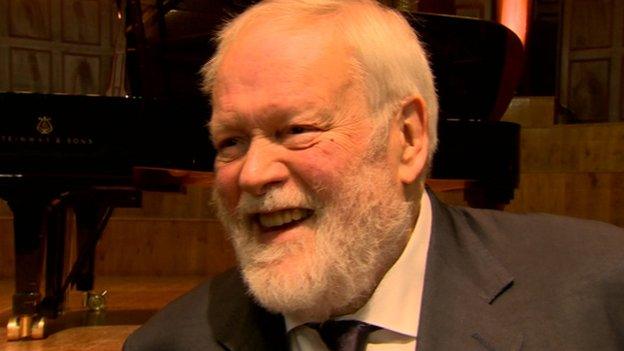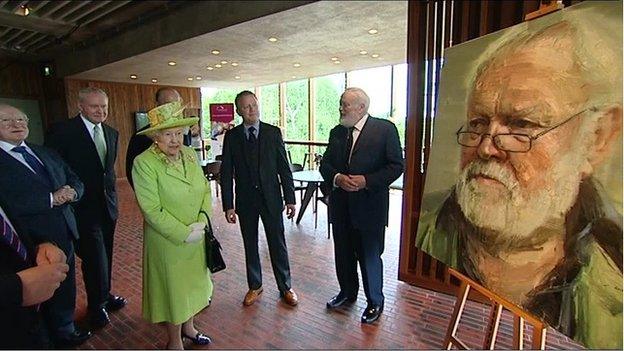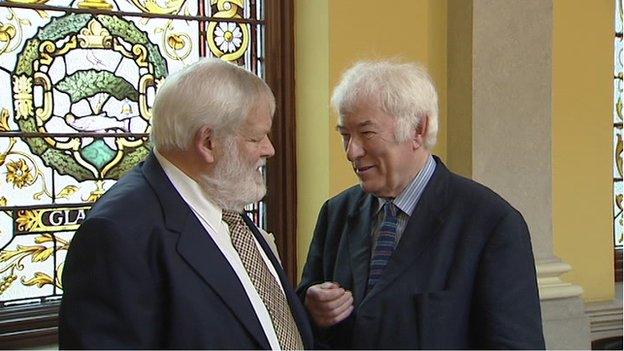Michael Longley: Poet honoured with freedom of Belfast
- Published

Michael Longley was honoured for his contribution to literature and to the cultural life of Belfast
The acclaimed poet Michael Longley has been granted the freedom of his native city of Belfast on Monday.
The honour is in recognition of his contribution to literature and to the cultural life of Belfast.
Longley was born in 1939 and published his first collection of poetry, No Continuing City, when he was 30.
His notable accolades to date include the Whitbread Poetry Award, the TS Eliot Prize and the Queen's Gold Medal for Poetry.
He held the post of Professor of Poetry for Ireland from 2007 to 2010.
On Monday night, the Irish President Michael D Higgins paid tribute to Longley in a ceremony at the Ulster Hall, describing him as a "remarkable man".
"The poems speak for themselves - eloquent, precise and passionate, large-hearted, intelligent and above all humane," he said.
"It is that humane quality in the life and in the work that, above all else, I wish to salute today."
'International acclaim'
Longley grew up with his twin brother and their older sister in Bristow Park, off south Belfast's Balmoral Avenue.
The son of a World War One veteran, he has described his childhood home as "comfortably middle-class".
He was educated at the Royal Belfast Academical Institution before studying classics at Trinity College, Dublin, where he met his wife Edna, a renowned literary critic who is a Professor Emerita at Queen's University, Belfast.
After college, he took a job as a teacher, working at schools in Belfast, Dublin and London.
Trinity appointed him as Writer Fellow in 1993 and he was also a fellow of the Royal Society of Literature.
Longley cites William Butler Yeats, Wilfred Owen, and DH Lawrence among his many poetic influences.
The Belfast's writer's work includes poems that address the Troubles in Northern Ireland and both world wars.

Longley was among the artists presented to the Queen and Irish President Michael D Higgins during a historic event at Belfast's Lyric theatre, when the monarch shook hands with Sinn Féin's Martin McGuinness for the first time
In an interview with Culture Northern Ireland, he said he was anxious not to produce "Troubles trash" but said his studies of the ancient Greek poet Homer enabled him "to write about our own poisonous conflict".
"We did not want to hitch a ride on yesterday's headlines - to write the poetry of the latest atrocity. We preferred an oblique approach. It was especially important to remember the victims," he said.
"My poems about the Troubles are elegies mostly. Their drift is remembrance."
The decision to honour Longley was taken by Belfast City Council earlier this year, after elected representatives supported a motion proposed by SDLP councillor Claire Hanna.
Her motion stated: "For over 50 years, he has brought honour to Belfast through his poetry, which has gained him international acclaim as one of the greatest poets writing in the English language."
In 2007, Northern Ireland's Deputy First Minister Martin McGuinness described Longley as "one of the most talented poets of our time".
Previous recipients of the freedom of Belfast include the Belfast-born singer Van Morrison and Olympic champion Mary Peters.

Michael Longley with the late Nobel laureate Seamus Heaney, whose death he described as like losing "a brother"